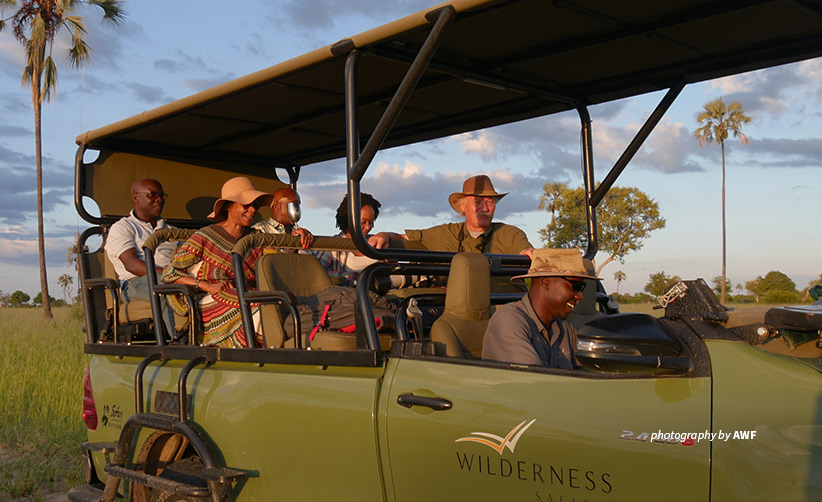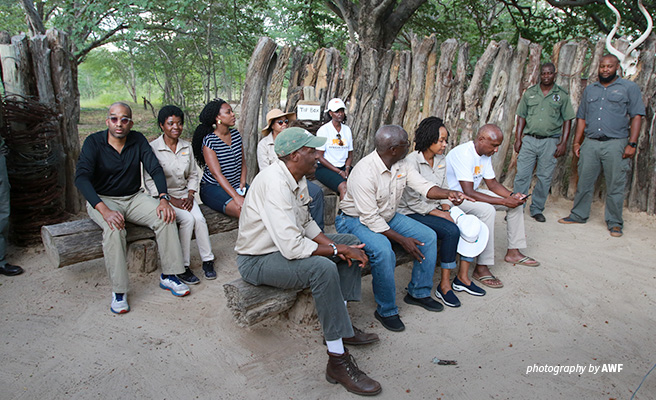Zimbabwe safari shows African business leaders the value of conservation

Nearly one year ago, a group of African business leaders took part in a special safari hosted by African Wildlife Foundation leadership and conservation experts at Wilderness Safaris at Davison’s Camp, a beautiful ecotourism lodge nestled in one of the most prolific wildlife areas in Zimbabwe’s Hwange National Park, to explore the role of African leadership and private investments in mitigating threats to Africa’s wildlife and wild lands.
Guests of AWF’s inaugural ‘C-suite Safari’ included: Kenya Commercial Bank Board Chairman Andrew Wambari Kairu; Vision Group CEO Robert Kabushenga; Nelson Mandela Foundation Trustee and Club of Rome Club Co-President Dr. Mamphela Ramphele; and IberSun Limited Partner Dr. M.K. Dorsey.
At the time of the safari in late February 2020, the COVID-19 pandemic was just arriving on the continent. The first confirmed case in sub-Saharan Africa was announced in Nigeria shortly after the trip concluded. Within three months, the virus had spread across the continent. Travel bans and restrictions, border closings, government shutdowns, and social distancing measures directly impacted national economies, not leaving small-scale conservation-friendly enterprises unscathed. The risk of reversing positive attitudes toward wildlife continued to grow with the spread of the coronavirus and the extension of travel bans. The tourism industry had never dealt with an economic blow of this magnitude and duration before. No one could have imagined the severity of the crisis that lay ahead for communities around the world, including those on the front lines of wildlife conservation.
Before we fully understood the challenges of the pandemic, attendees of the corporate safari used the opportunity with AWF’s experts to grapple with questions regarding how conservation can impact on GDP; how to leverage the natural environment sustainably to generate enjoyment, knowledge, and wealth; and how Africans can scale up revenue-sharing models exhibited by companies in the safari sector and other industries with business investments in rural areas. The safari experience crafted by AWF helped illuminate the need for a holistic approach to creating more durable and insulated local economies, while shining a light on the contributions of the wildlife tourism sector to sustain both revenue generation and conservation efforts in wildlife-rich areas.

AWF conservation experts and African business leaders during a learning session organized by Wilderness Safaris in Zimbabwe
By April 2020, the pandemic was in full swing. AWF convened a meeting of 12 CEOs of leading safari companies operating in Africa to identify how the pandemic was impacting their core business operations and posing threats to wildlife conservation areas. They also discussed the best ways to support the safari industry in its efforts to sustain local communities that rely on tourism.
For far too long, conservation and development have been erroneously viewed as opposing forces. Likewise, conservation is often perceived to be led by only foreign interests. The reality is that Africa’s rich biodiversity and ecosystems impact its economies — manufacturing, infrastructure, beauty care supply chain, energy, food security, tourism, and much more. Protecting ecosystem services is directly and indirectly beneficial to many industries, and businesses can positively impact the welfare of people and wildlife alike. Through private sector partnerships that are conscious of environmental, social, and governance needs, AWF can work with businesses in Africa to create wildlife economies that support positive conservation outcomes, local community development, job opportunities, and their bottom line.
Within the tourism industry in Africa, domestic and regional markets have been historically ignored, inhibiting opportunities for nationals to experience their natural heritage and simultaneously limiting the customer base of safari operators. In the wake of the pandemic, AWF will double down on its efforts to influence the establishment of a circular economy, engaging safari partners to identify favorable price points for all economic segments so that engagement in tourism is more inclusive.
As AWF celebrates the first anniversary of the inaugural safari for African business leaders, the organization remains committed to engaging the African business community to ensure that wildlife and wild lands thrive in modern Africa.
With 60 years of conservation experience on the continent, AWF has developed a 10-year strategic vision that elevates African leadership, which drives shifts in policy, planning, and finance to restore ecosystems and the services they provide. African nationals and local business leaders must be part of the solution to ensure that positive outcomes are collectively owned. The C-suite Safari creates a forum for business leaders and influencers in Africa to see first-hand the beauty of Africa’s natural landscapes and explore their role in conserving it for the benefit of people and wildlife.
Given AWF’s keen interest in African leadership and increasing a sense of ownership among African nationals, AWF is also affiliated with the Young Presidents Organization, helping to educate members about conservation. In December 2020, AWF briefed members of the Young Presidents Organization on the poaching crisis and other issues relating to human-wildlife conflict. Future events with members will be organized to tap into the perspectives of its network of CEOs on the ground in Africa.
By increasing awareness among businesses about their vital role in conservation and its returns, AWF seeks to expand the sphere of African influencers engaged in these essential conversations and who actively participate in shaping the trajectory of development in Africa, leading to a future where the continent’s wildlife and wild lands are valued as both economic and cultural assets.
> Learn more about wildlife economies and how they impact conservation